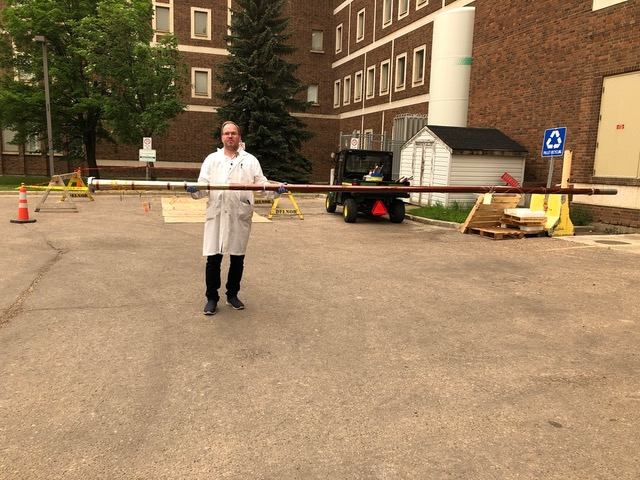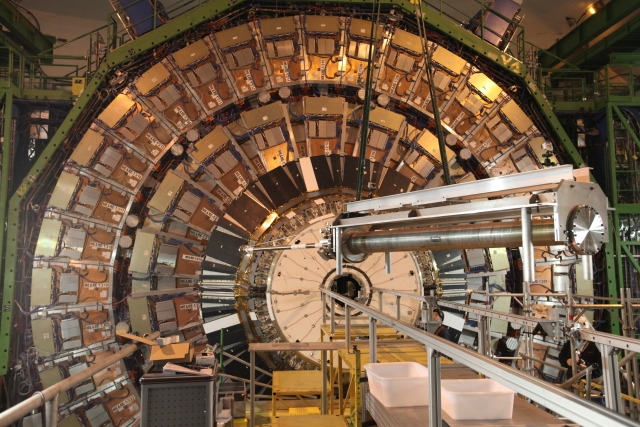Monday, 19 August 2024
New research using a decommissioned section of the beam pipe from the Large Hadron Collider (LHC) at CERN has brought scientists closer than ever before to test whether magnetic monopoles exist.
Scientists from the University of Nottingham, in collaboration with an international team have revealed the most stringent constraints yet on the existence of magnetic monopoles, pushing the boundaries of what is known about these elusive particles. Their research has been published today in Physical Review Letters.
In particle physics, a magnetic monopole is a hypothetical elementary particle that is an isolated magnet with only one magnetic pole (a north pole without a south pole or vice versa).
Could there be particles with only a single magnetic pole, either north or south? This intriguing possibility, championed by renowned physicists Pierre Curie, Paul Dirac, and Joseph Polchinski, has remained one of the most captivating mysteries in theoretical physics. Confirming their existence would be transformative for physics, yet to date experimental searches have come up empty handed.
 MoEDAL's technical coordinator R. Soluk holds the decommissioned CMS beam pipe donated to MoEDAL to search for highly charged magnetic monopoles.
MoEDAL's technical coordinator R. Soluk holds the decommissioned CMS beam pipe donated to MoEDAL to search for highly charged magnetic monopoles.
The team focused their search on a decommissioned section of the beam pipe from the LHC at CERN, the European Organisation for Nuclear Research. Conducted by physicists from the Monopole and Exotics Detector at the LHC (MoEDAL) experiment, the study examined a beryllium beam pipe section that had been located at the particle collision point for the Compact Muon Solenoid (CMS) experiment. This pipe had endured radiation from billions of ultra-high-energy ion collisions occurring just centimetres away.
"The proximity of the beam pipe to the collision point of ultra-relativistic heavy ions provides a unique opportunity to probe monopoles with unprecedentedly high magnetic charges," explained Aditya Upreti, a Ph.D. candidate who led the experimental analysis while working in Professor Ostrovskiy's MoEDAL group at the University of Alabama. "Since magnetic charge is conserved, the monopoles cannot decay and are expected to get trapped by the pipe's material, which allows us to reliably search for them with a device directly sensitive to magnetic charge".
 The beryllium beam pipe of the CMS experiment at the Large Hadron Collider.
The beryllium beam pipe of the CMS experiment at the Large Hadron Collider.
The researchers investigated the production of magnetic monopoles during heavy ion collisions at the LHC, which generated magnetic fields even stronger than those of rapidly spinning neutron stars. Such intense fields could lead to the spontaneous creation of magnetic monopoles through the Schwinger mechanism.
Oliver, the lead theorist for the study, added: “Despite being an old piece of pipe destined for disposal, our predictions indicated it might be the most promising place on Earth to find a magnetic monopole,”
The MoEDAL collaboration used a superconductive magnetometer to scan the beam pipe for signatures of trapped magnetic charge. Although they found no evidence of magnetic monopoles, their results exclude the existence of monopoles lighter than 80 GeV/c² (where c is the speed of light) and provide the world-leading constraints for magnetic charges ranging from 2 to 45 base units.
The research team now plans to extend their search, Oliver concludes: “The beam pipe that we used was from the first run of the Large Hadron Collider, which was carried out before 2013 and at lower energies. Extending the study to a more recent run at higher energies could double our experimental reach. We are also now considering completely different search strategies for magnetic monopoles.”
Story credits
DOI: 10.1103/PhysRevLett.133.071803
Paper available here: https://journals.aps.org/prl/abstract/10.1103/PhysRevLett.133.071803
More information is available from Oliver Gould on Oliver.Gould@nottingham.ac.uk or Jane Icke, Media Relations Manager for the Faculty of Science at the University of Nottingham, on 0115 7486462 or jane.icke@nottingham.ac.uk
Notes to editors:
About the University of Nottingham
Ranked 24 in Europe and 15th in the UK by the QS World University Rankings: Europe 2024, the University of Nottingham is a founding member of Russell Group of research-intensive universities. Studying at the University of Nottingham is a life-changing experience, and we pride ourselves on unlocking the potential of our students. We have a pioneering spirit, expressed in the vision of our founder Sir Jesse Boot, which has seen us lead the way in establishing campuses in China and Malaysia - part of a globally connected network of education, research and industrial engagement.
Nottingham was crowned Sports University of the Year by The Times and Sunday Times Good University Guide 2024 – the third time it has been given the honour since 2018 – and by the Daily Mail University Guide 2024.
The university is among the best universities in the UK for the strength of our research, positioned seventh for research power in the UK according to REF 2021. The birthplace of discoveries such as MRI and ibuprofen, our innovations transform lives and tackle global problems such as sustainable food supplies, ending modern slavery, developing greener transport, and reducing reliance on fossil fuels.
The university is a major employer and industry partner - locally and globally - and our graduates are the third most targeted by the UK's top employers, according to The Graduate Market in 2024 report by High Fliers Research.
We lead the Universities for Nottingham initiative, in partnership with Nottingham Trent University, a pioneering collaboration between the city’s two world-class institutions to improve levels of prosperity, opportunity, sustainability, health and wellbeing for residents in the city and region we are proud to call home.
More news…